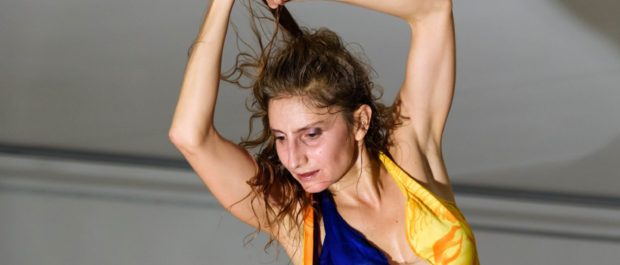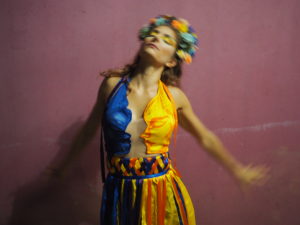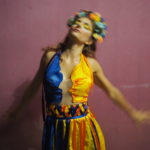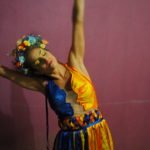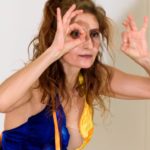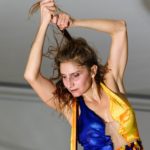“CREASPLENDORE” (2017)
“CREASPLENDORE” AFRO CONTEMPORARY DANCE SHOW
Compagnia Roberta Tirassa
Spettacolo di danza afro contemporanea
Coreografia: Roberta Tirassa (Italia)
Musica: Bira Santos, Massimo Barbiero, Nanà Vasconcelos
Danza: Roberta Tirassa (Italia)
Supervisione artistica e opere: Marco Sbizzera (Italia)
Costume: Prof. Wagner Lacerda (Brasile)
Fotografie: Anouk Mulard e Giorgio Ceradelli
Disegni e poemi: Roberta Tirassa
Compagnia Roberta Tirassa
Afro Contemporary dance show
Choreography: Roberta Tirassa (Italy)
Music: Bira Santos (brasil), Massimo Barbiero (Italy), Nanà Vasconcelos
Dance, poems, paintings: Roberta Tirassa (Italy)
Artistic supervision and art work on stage: Marco Sbizzera (Italy)
Photographies: Anouk Mulard (France), Giorgio Ceradelli (Italy)
-
“Creasplendore” è una composizione ispirata al Cantico delle creature di S. Francesco d’Assisi, primo poema della letteratura italiana (1226 circa). La danza è un inno alla vita, alla pace e una preghiera alla bellezza; una celebrazione della natura e delle sue ricchezze e paesaggi. L’opera è divisa in tre quadri: Luna, Sole, Pace.
Il lavoro è stato sviluppato da Roberta durante diverse residenze creative in Italia, Salvador de Bahia (Brasile), Londra (UK), Norvegia e Alicante (Spagna). Diversi paesaggi ed elementi si sono quindi intersecati durante il processo creativo così come la condivisione con più coreografi. In un sincretismo culturale, religioso e spirituale, la danza attinge alla simbologia delle danze degli Orixás del Vodoun africano e del Candomblé brasiliano (Oxossi, Oxalà, Iemanjá, Oxumaré e Iansã), ritrovandone una gestualità nuova personalizzata e profondamente incorporata. Il solo è caratterizzato da una gestualità espansa, con una scrittura contemporanea espressiva basata sul flusso, sul respiro, sull’attacco.
Sono connessi alla danza anche poemi e disegni di Roberta Tirassa.
SYNOPSIS:
The solo is a dance composition inspired by the “Cantico delle creature” (Canticle of the Creatures) of S. Francesco from Assisi, the first poem of italian literature (around 1226).
The dance piece is an hymn to life, peace and a reverence to beauty, to nature and all its forms. it’s divided in three parts: Moon, Sun, Peace.The dance has been developed by Roberta during different stays in Italy, Salvador de Bahia (Brazil), London (UK), Norway and Alicante (Spain). Different landscapes and natural elements have influenced the work during the last year and the encounter and sharing with different choreographers too.
The language of the solo takes its origins from the African dances, also reelaborating the dances of some Orixás (from Benin Vodoun and Brsilian Candomblé) and their symbology. So we encounter Oxossi the God of the forests and hunting, Oxumaré the God of the rainbow and snake, representing the cycle of life, Oxalà the old and wise, father of all Gods and creator of the Earth and Iemanjá the Goddess of sea waters.The composition is expanded and refined by a contemporary writing based on flow, breath, attack and expression. The intent and the research in the body and in the artistic journey and life of the dancer reflect the spiritual syncretism and hybridism of languages, styles, religions and cultures between Africa, Europe and Brasil.
An ibook of poems and photographs, about the dance composition, will be soon on the market too.
SUPPORT:
Glosolì International Residency for Artists, directed by associazione Glosoli, in Ivrea (TO), Italy.
Espaço Cronopios, directed by Licia Morais, Salvador da Bahia, Brazil.
Casarão Barabadá, directed by Daniela Amoroso, Salvador de Bahia (Brazil). - Lunghezza dello spettacolo/show lenght: 50 min
Compagnia Roberta Tirassa
Afro Contemporary dance show
Choreography: Roberta Tirassa (Italy)
Music: Bira Santos (brasil), Massimo Barbiero (Italy), Nanà Vasconcelos
Dance, poems, paintings: Roberta Tirassa (Italy)
Artistic supervision and art work on stage: Marco Sbizzera (Italy)
Photographies: Anouk Mulard (France), Giorgio Ceradelli (Italy) -
Con il sostegno di-With the support of:
Glosolì International Residency for Artists, directed by associazione Glosoli, in Ivrea (TO), Italy.
Espaço Cronopios, directed by Licia Moraes, Salvador da Bahia, Brazil.
Casarão Barabadá, directed by Daniela Amoroso, Salvador de Bahia, Brazil.Photographies: Anouk Mulard (France), Giorgio Ceradelli (Italy)
- Photo: Anouk Mulard
- Photo: Anouk Mulard
- Photo: Giorgio Ceradelli
- Photo: Giorgio Ceradelli
- Photo: Giorgio Ceradelli

